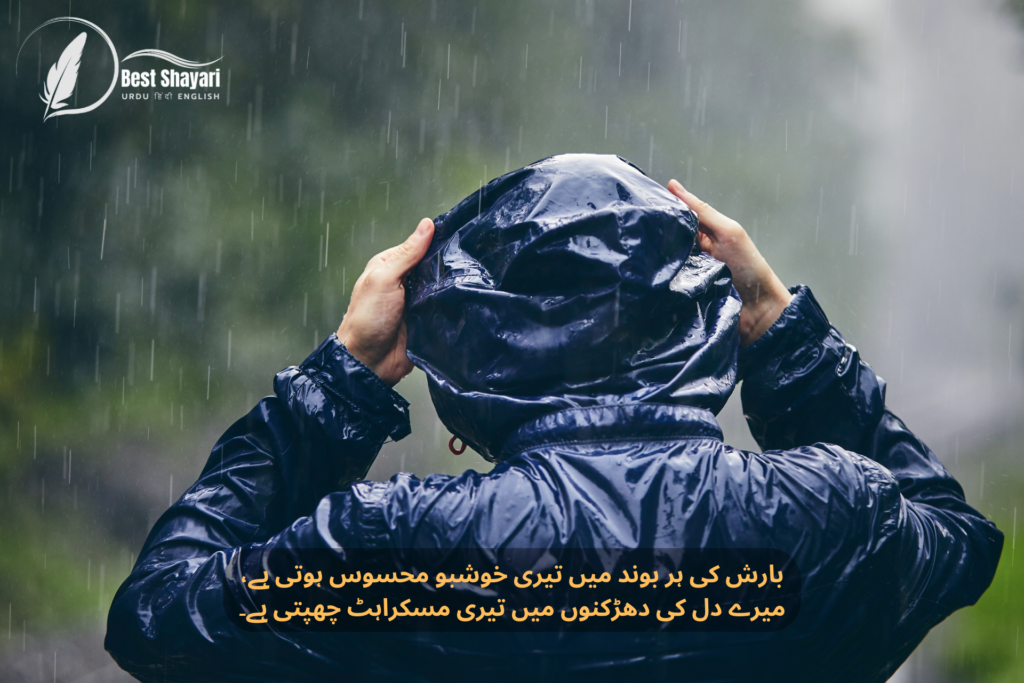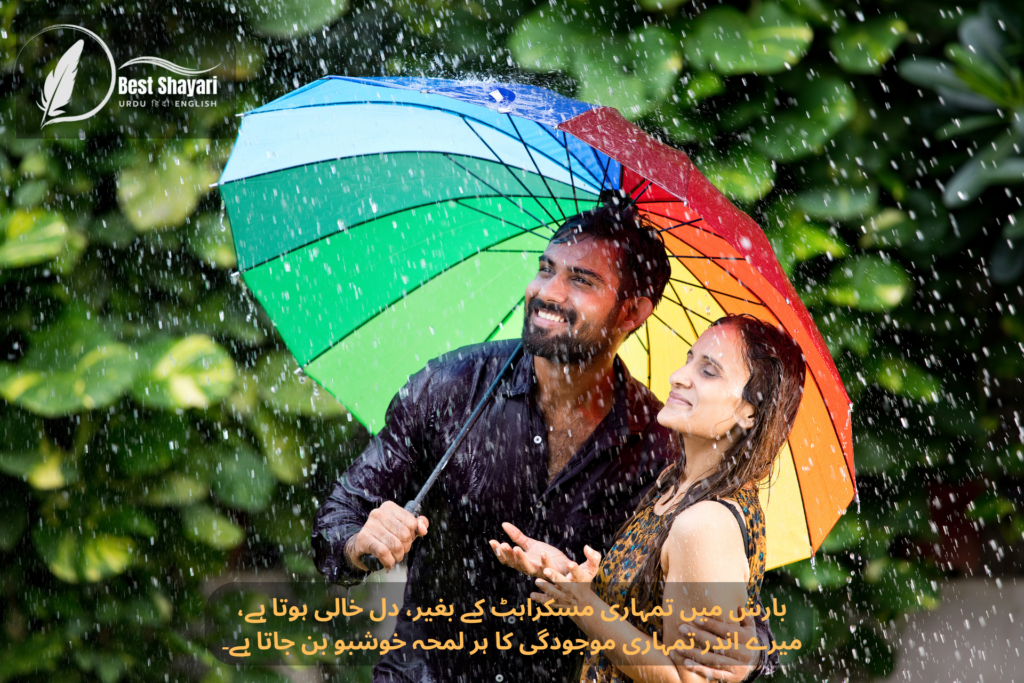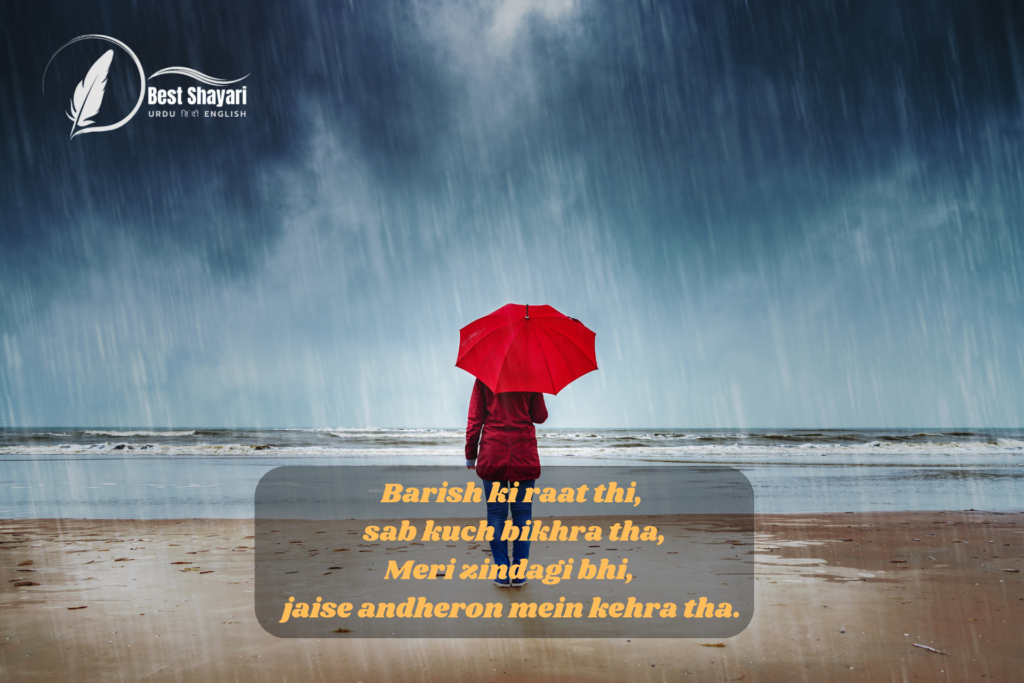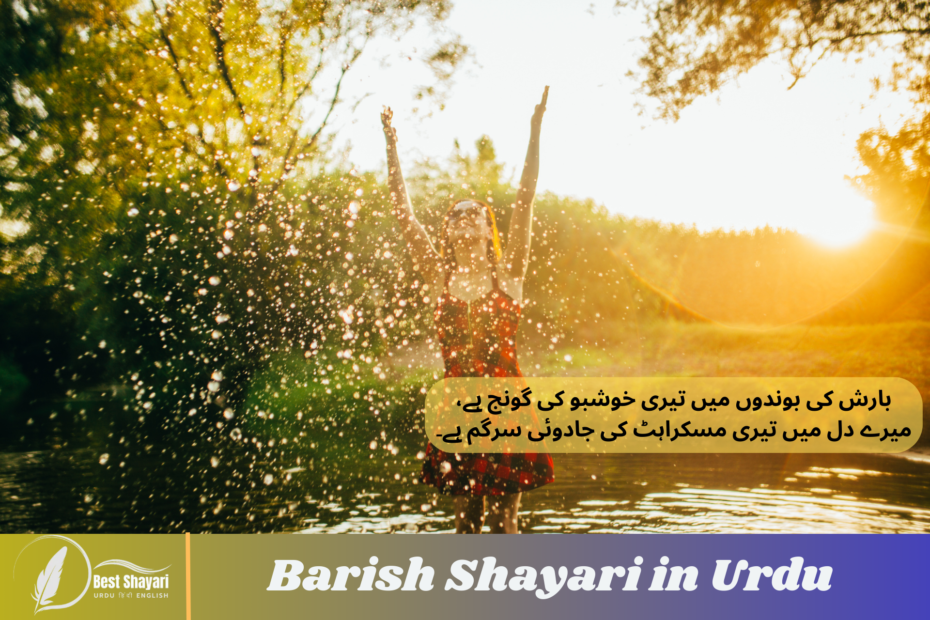Barish Shayari in Urdu, or rain poetry, holds a cherished place in Urdu literature, encapsulating the magic and mystique of rain. Rain has long been a muse for poets, symbolizing emotions like love, longing, melancholy, and hope. In Urdu poetry, or Shayari, rain is a recurring theme that captures both the beauty of nature and the depth of human emotion. This article explores the profound beauty and cultural significance of Barish Shayari, offering insights into its themes, famous poets, and timeless verses.
Introduction to Barish Shayari in Urdu
Barish Shayari in Urdu is more than just words about rain; it’s a deep expression of human emotions. Urdu poets have been fascinated by the symbolic power of rain for centuries. In Urdu poetry, rain is associated with various emotional states, from the sorrow of unfulfilled love to the joy of new beginnings. Rain often represents the poet’s inner feelings, bringing solace or reflecting a troubled heart. Through Barish Shayari, poets express complex emotions, connecting readers to universal experiences of joy, sorrow, and nostalgia.
Why Rain Inspires Urdu Poets
Rain is a powerful metaphor in Urdu poetry, symbolizing purity, renewal, and sometimes, the melancholy of separation. The rhythmic sound of raindrops, the fragrance of wet earth, and the sight of cloudy skies stir emotions that inspire poets to write. The romantic allure of rain is universal, but in Urdu Shayari, it often embodies the intensity of passion and the sadness of separation. This unique cultural connection between rain and emotion makes Barish Shayari a popular genre in Urdu literature.
Themes in Barish Shayari in Urdu
Romance and Rain
In Barish Shayari in Urdu, rain is often used to depict love and romance. Many poets express how raindrops seem to whisper messages from a loved one, and how the sight of rain reminds them of cherished memories. Rain brings a sense of closeness, symbolizing the union of two souls and rekindling the warmth of a lover’s presence. For example, a poet might write about standing in the rain, feeling the droplets as a reminder of their beloved’s touch.
Example: “Yeh baarish ka mausam, tere ishq ki yaad dilata hai, Har boond mein tera ehsaas bas jata hai.”
Translation:
“This rainy season reminds me of your love,
Each drop brings the essence of you.”
Here Is A Some Lines For Barish Shayari in Urdu;

بارش کی بوندیں تیری یادوں کی طرح ہیں،
ہر ایک قطرہ میں کچھ پرانی باتیں ہیں۔
بارش کے موسم میں دل بھی بھیگ جاتا ہے،
جب بھی تیری یاد آتی ہے، آنکھوں سے قطرہ ٹوٹ جاتا ہے۔
بارش کے بعد خوشبو، جیسے تُو پاس ہو،
دل کی ایک ایک بات، تیری یادوں کے ساتھ ہو۔
بارش کے موسم میں دل بے چین رہتا ہے،
ہر پل تُو مجھ سے ملنے کو ترستا رہتا ہے۔
بارش کی بوندیں جب تیری یادوں سے ملتی ہیں،
دل کے گوشے میں تیری ہنسی کی گونج سنائی دیتی ہے۔
بارش میں تیری یادیں اور زیادہ شدت سے آتی ہیں،
میرے دل کی دھڑکنیں بھی تیرے نام پر چلتی ہیں۔
بارش کی بوندوں میں تیرے لبوں کی خوشبو ہے،
میرے دل کی ہر دھڑکن میں تیری جُستجو ہے۔
بارش میں تیری یادوں کا رنگ اور گہرا ہو جاتا ہے،
میرے دل کی ہر بات، تیری خواہشوں سے جڑا ہو جاتا ہے۔
بارش کے موسم میں دل کی بوندیں کبھی ختم نہیں ہوتیں،
تھیں بھی پرانی باتیں، پر یادیں کبھی کم نہیں ہوتیں۔
بارش میں تیرے نہ ہونے کا احساس کچھ اور گہرا ہوتا ہے،
دل میں تجھے یاد کرنا اور بھی مہک جاتا ہے۔
بارش میں جب بھی تمہاری یاد آئی،
میرے دل میں ایک اور انوکھا گم ہو گیا۔
بارش کی ہر بوند میں تمہارا عکس نظر آتا ہے،
میرے دل کے اندر تمہاری آواز سنائی دیتی ہے۔
بارش میں جب دل ادھورا ہو،
تب یادیں مکمل ہو جاتی ہیں، تمہارے ب بغیر۔
بارش میں جب ہو تم، تو کوئی غم نہیں ہوتا،
دل میں تمہاری مسکراہٹ ہمیشہ رہتی ہے۔
بارش میں تیری یادیں رنگوں کی طرح بکھر جاتی ہیں،
میرے دل میں تیری تصاویر چلنے لگتی ہیں۔
بارش میں دل کی ہر خواہش تمہارے سامنے آتی ہے،
میرے اندر تمہاری دعائیں جو تیز ہو جاتی ہیں۔
بارش کی بوندوں میں تیری نرم مسکراہٹ دکھائی دیتی ہے،
میرے دل کی گہرائیوں میں تیری محبت گہری رہ جاتی ہے۔
بارش میں تیرے لمس کی گواہی ملتی ہے،
میرے دل میں تیری محبت کی تکمیل ہوتی ہے۔
بارش کی بوندوں میں تیری خوشبو آتی ہے،
میرے دل کی دھڑکنوں میں تیرے ساتھ کی یادیں چھپتی ہیں۔
بارش میں جب تمہارا چہرہ نظر آتا ہے،
میرے دل کی گہرائیوں میں تمہاری یادیں بڑھتی ہیں۔
بارش میں تمہاری مسکراہٹ کی ہنسی سنائی دیتی ہے،
میرے دل کے اندر تمہاری خوشبو کے بادل چھا جاتے ہیں۔
بارش کے قطرے جیسے تمہاری یادیں ہیں،
دل کی گہرائیوں میں تمہاری باتیں چھپی رہتی ہیں۔
بارش میں تمہاری موجودگی کا احساس،
میرے دل کی دھڑکن میں تمہاری مسکراہٹ کا راز چھپتا ہے۔
بارش میں تمہاری مسکراہٹ کے بغیر، دل خالی ہوتا ہے،
میرے اندر تمہاری موجودگی کا ہر لمحہ خوشبو بن جاتا ہے۔
بارش میں جب تیری مسکراہٹ دل میں اتر آتی ہے،
میرے دل کی ہر خواہش تمہاری یادوں میں محو ہوجاتی ہے۔
بارش کی بوندوں میں تیری یادیں رقص کرتی ہیں،
میرے دل کے کمرے میں تیری مسکراہٹ بکھرتی ہے۔
بارش کی ہر بوند میں تیری خوشبو محسوس ہوتی ہے،
میرے دل کی دھڑکنوں میں تیری مسکراہٹ چھپتی ہے۔
بارش کا موسم اور تیری یادوں کا ساتھ ہے،
میرے دل میں تیری مسکراہٹ کی مہک ہے۔
بارش کی بوندیں تیری محبت کی طرح ہیں،
جو دل میں بسی رہتی ہیں اور کبھی ختم نہیں ہوتیں۔
بارش میں تیری یادوں کا رنگ اور بھی گہرا ہو جاتا ہے،
میرے دل کی ہر دھڑکن میں تیری باتیں چھپ جاتی ہیں۔
بارش میں تیری یادیں جیسے بوندوں میں گم ہو جاتی ہیں،
میرے دل میں تیری ہنسی کی آواز گونجتی رہتی ہے۔
بارش کی ہر بوند میں تیری مسکراہٹ کی جھلک آتی ہے،
میرے دل کے اندر تیری محبت کی روشنی ہو جاتی ہے۔
بارش کی بوندوں میں تیری خوشبو کی گونج ہے،
میرے دل میں تیری مسکراہٹ کی جادوئی سرگم ہے۔
بارش میں تمہاری یادوں کا رنگ اور گہرا ہو جاتا ہے،
میرے دل میں تمہاری مسکراہٹ کا عکس گم ہو جاتا ہے۔
بارش کے قطرے تیرے لبوں کی طرح ہیں،
میرے دل میں تمہاری یادیں ہمیشہ رہتی ہیں۔
بارش کے موسم میں تیری یادیں اور زیادہ قریب لگتی ہیں،
میرے دل میں تمہاری مسکراہٹ ہر لمحہ محسوس ہوتی ہے۔
بارش کی ہر بوند میں تمہاری باتوں کا رنگ نظر آتا ہے،
میرے دل کی دھڑکنوں میں تمہاری یادیں گم ہوتی ہیں۔
بارش کی بوندوں میں تمہاری مسکراہٹ گم ہو جاتی ہے،
میرے دل کی دھڑکنوں میں تمہاری یادیں چھپ جاتی ہیں۔
بارش میں تمہاری یادوں کا رنگ اور گہرا ہو جاتا ہے،
میرے دل کی دھڑکن میں تمہاری خوشبو رہ جاتی ہے۔
بارش کی بوندوں میں تمہاری مسکراہٹ کا راز ہے،
میرے دل کی دھڑکنوں میں تمہاری ہنسی کی گونج ہے۔
بارش کی بوندوں میں تمہاری مسکراہٹ کی خوشبو ہے،
میرے دل کی گہرائیوں میں تمہاری یادوں کا رنگ ہے۔
بارش میں تمہاری یادوں کا رنگ دل میں پھیل جاتا ہے،
میرے دل کی ہر دھڑکن میں تمہاری مسکراہٹ گونجتی ہے۔
بارش کی بوندوں میں تمہاری ہنسی کی گونج ہے،
میرے دل کی دھڑکنوں میں تمہاری مسکراہٹ کی خوشبو ہے۔
بارش کی بوندوں میں تمہاری مسکراہٹ کی رنگینی ہے،
میرے دل میں تمہاری یادوں کا موسم ہے۔
بارش میں تمہاری مسکراہٹ دل کی دھڑکنوں کی طرح ہے،
میرے دل میں تمہاری محبت کا رنگ ہے۔
بارش کی بوندوں میں تمہاری یادیں گم ہو جاتی ہیں،
میرے دل میں تمہاری مسکراہٹ کا رنگ بکھر جاتا ہے۔
بارش کی بوندوں میں تمہاری مسکراہٹ کا رنگ نظر آتا ہے،
میرے دل کی گہرائیوں میں تمہاری یادیں گم ہو جاتی ہیں۔
بارش کی بوندوں میں تمہاری مسکراہٹ کی خوشبو ہوتی ہے،
میرے دل کی دھڑکن میں تمہاری ہنسی کی آواز آتی ہے۔
بارش میں تمہاری مسکراہٹ کا رنگ دل میں پھیل جاتا ہے،
میرے دل کی دھڑکنوں میں تمہاری یادیں چھپ جاتی ہیں۔
بارش کی بوندوں میں تمہاری یادوں کی گونج ہے،
میرے دل میں تمہاری مسکراہٹ کی مہک ہے۔

Melancholy and Yearning
Rain in Urdu poetry also embodies sorrow and separation. It can symbolize a yearning for something lost or a pain that won’t fade. Poets use the imagery of rain to reflect on lost love, often comparing the falling rain to their own tears. This theme resonates with those who feel the pangs of unfulfilled desires or distant memories.
Example: “Barish mein behte aansu ka kuch asar nahi hota,
Jise khoya hai uske bina dil kabhi magar nahi hota.”
Translation:
“Tears flowing in the rain go unnoticed,
Without the one I’ve lost, my heart will never be whole.”
Rain as Renewal and Hope
While Barish Shayari often speaks of love and sorrow, it can also convey hope and rejuvenation. Rain brings life to dry lands, symbolizing renewal and new beginnings. Poets may use rain as a metaphor for personal growth, healing, or a fresh start, encouraging readers to find beauty even after hardship.
Example: “Barish ke baad khilta hai naya phool,
Zindagi mein bhi har gum ke baad aati hai sukoon ki ghadi.”
Translation:
“After the rain, a new flower blooms,
In life, too, peace comes after every sorrow.”
Famous Barish Shayari in Urdu
Urdu poetry is filled with beautiful examples of Barish Shayari in Urdu, with lines that capture the heart. Let’s look at some of the timeless verses from famous poets and the meanings behind them.
Mirza Ghalib
One of the greatest Urdu poets, Mirza Ghalib, often used rain imagery in his works. His poetry touches on the transient nature of life and love, with rain acting as a symbol of fleeting emotions.
Example: “Barsaat mein phir se yaad aaye woh,
Har boond mein chhupi hai kahani uske sath ki.”
Translation:
“In the rain, I remember her again,
Each drop hides a story of us together.”
Faiz Ahmed Faiz
Faiz’s poetry often reflects a sense of hope and struggle, and rain is sometimes depicted as a sign of endurance. Faiz uses rain to symbolize the resilience needed to overcome hardship.
Example: “Woh barsaat thi jo dard ko bhi dhundhla kar gayi,
Ab bhi boondein girti hain, par dard ko kam nahi karti.”
Translation:
“That rain blurred even the pain,
Now, the raindrops fall, but the pain does not lessen.”
Parveen Shakir
Parveen Shakir is known for her delicate portrayal of emotions, especially in the context of love and loneliness. Her verses on rain resonate with a feeling of nostalgia and the sweetness of remembered love.
Example: “Tumhari yaad mein bhi barish ka sukoon hai,
Jaise barson baad wapas mila ho.”
Translation:
“Your memory has the peace of rain,
As if something lost has been found after years.”
How to Enjoy Barish Shayari in Urdu
Reading with Background Music
One way to appreciate Barish Shayari in Urdu is by reading it with soft, instrumental music in the background. This enhances the experience and brings out the emotions in each line. Rain sounds or classical music can complement the poetry, creating a relaxing and immersive environment.
Sharing on Social Media
Barish Shayari is popular on social media, especially during the rainy season. Sharing verses or couplets on platforms like Instagram and Twitter helps spread its charm and connects people who feel a similar love for rain. Accompanying these posts with visuals of rain or nature makes them even more captivating.
Writing Your Own Barish Shayari
If you enjoy writing, try crafting your own Barish Shayari in Urdu. Think about what rain means to you – does it evoke memories, dreams, or reflections? Start with a simple line about the feeling of rain and let your emotions flow. Even a short verse can capture the beauty and emotion rain brings.
Popular Barish Shayari Couplets
Here are a few more beloved couplets that capture the spirit of Barish Shayari in Urdu:
Example 1:
“Barish ki boondein uske chehre ka noor ban gayi,
Woh khadi thi, aur saari duniya ruk gayi.”
Translation:
“The raindrops became the radiance of her face,
She stood still, and the whole world paused.”
Example 2:
“Barish ka mausam aur tumhari yaad,
Jaise ek hi baras mein do mousam aagaye.”
Translation:
“The season of rain and your memory,
It feels like two seasons in one year.”
Example 3:
“Yeh barsaat ka mausam, dil mein ajeeb sa ehsaas jagata hai,
Jaise tumhare paas hoon, aur phir bhi kitni door hoon.”
Translation:
“This rainy season stirs a strange feeling in my heart,
As if I’m close to you, yet so far.”
The Emotional Impact of Barish Shayari
Barish Shayari in Urdu has an uncanny ability to evoke deep emotions in the reader. Whether it’s the joy of reunification, the sadness of separation, or the hopeful beginnings that rain often symbolizes, the verses seem to capture the very essence of human feelings. For readers, it is not just about the poetry itself but about what it represents—moments of vulnerability, passion, and introspection.
Connecting with the Emotions Behind the Words

See Also Ladki ke Liya Shayari In English
What makes Barish Shayari special is the way it connects the emotional state of the poet to the external world. The poet’s internal feelings are often mirrored in the imagery of the rain. When poets talk about longing, sorrow, or love in the context of rain, they are describing an emotional climate that mirrors the natural one. For instance, the feeling of longing during the rain might be compared to the heavy clouds that seem to never part. The beauty of the poetry lies in how effectively these feelings are conveyed through simple yet powerful imagery.
Example: “Barish ki raat thi, sab kuch bikhra tha,
Meri zindagi bhi, jaise andheron mein kehra tha.”
Translation:
“It was a rainy night, everything was scattered,
My life too seemed to be lost in the darkness.”
This simple couplet expresses the disarray that comes with personal turmoil, using the backdrop of a rainy night to deepen the emotional connection.
Modern Interpretations of Barish Shayari
While Barish Shayari in Urdu has its roots in classical poetry, modern poets continue to weave this theme into contemporary poetry. Today’s poets might reference the sound of rain hitting a windowpane, or the sight of a dark cloud in the sky, to talk about modern-day relationships or personal growth. These contemporary forms make Barish Shayari accessible to the new generation while keeping the emotional depth intact.
Technology and Barish Shayari in Urdu
In the digital age, Barish Shayari has evolved from the pages of Urdu literature books to online platforms like Instagram, WhatsApp, and Twitter. Shorter, more digestible verses are often shared as status updates or on social media posts, accompanied by photos or videos of rainfall. The popularity of rain-themed poetry has given rise to hashtags and online communities that celebrate rain, allowing for a global appreciation of the genre.
Example: “Boond boond ki baarish, aur yeh socha hai humne,
Tumse milne ka waqt, aaj se humne.”
Translation:
“Raindrop by raindrop, we thought today,
We shall meet you, starting from today.”
Such verses resonate on social media because they are relatable and convey longing and affection that many people share in a modern context.
The Role of Nature in Shaping Barish Shayari in Urdu
Urdu poets have long drawn inspiration from nature, and rain stands out as one of the most significant elements in their creative expression. In addition to rain, poets often incorporate imagery of rivers, mountains, winds, and fields, but rain has a unique way of symbolizing different facets of human emotion.
Nature as a Reflection of the Soul
In many Barish Shayari in Urdu verses, rain is depicted not just as a weather phenomenon but as a reflection of the poet’s inner world. The gray skies and cloudy atmosphere are often seen as representations of the poet’s own moods, while the falling rain suggests the washing away of sorrow or the release of pent-up emotions.
Example: “Yeh baarish ki dhundli si raatein,
Dil ki udaasi ko pyaar bana leti hai.”
Translation:
“These foggy nights of rain,
Turn the sadness of the heart into love.”
This verse beautifully captures how rain can transform negative emotions into something more positive, just like how a storm clears the skies to reveal calm weather.
The Universal Appeal of Barish Shayari
What makes Barish Shayari so universally appealing is its ability to connect to human emotions irrespective of cultural backgrounds. While the rain might differ in form and intensity around the world, its symbolic meanings remain similar. Whether you are in the deserts of the Middle East or the monsoon-drenched lands of South Asia, rain evokes feelings of nostalgia, renewal, and reflection.
A Global Phenomenon
Rain poetry, much like Barish Shayari in Urdu, has found its way into various global cultures, although the language and style may differ. In the West, poets often draw upon nature and the rain to express loneliness, love, or the passage of time. Similarly, in Japan, the beauty of cherry blossoms in the rain evokes melancholy and longing in traditional haikus. The universality of rain as a subject for poetry helps establish Barish Shayari’s relevance even beyond the confines of the Urdu language.
How to Incorporate Barish Shayari into Your Life
There’s a certain timeless quality to Barish Shayari that continues to resonate with people today. Many find it therapeutic to read or write poetry that reflects the emotional experiences evoked by rain. It can be a source of solace during rainy weather or a way to express emotions that are otherwise difficult to articulate.
Using Barish Shayari for Self-Reflection
One of the best ways to incorporate Barish Shayari into your life is by using it for self-reflection. During the rainy season, spend some time outdoors or look out your window and absorb the atmosphere. As you hear the rain fall, think about the emotions it stirs within you. Is it nostalgia? Is it yearning? Is it joy? Use this time to connect with your emotions, and perhaps write your own Barish Shayari.
Barish Shayari as a Gift
Barish Shayari can also be a beautiful gift to someone you love. Sharing a heartfelt verse with a loved one during the rainy season can strengthen your connection, as the words often convey emotions that are difficult to express face-to-face. Whether it’s through a message, a card, or even a poem recited on a rainy evening, Barish Shayari can create lasting memories.
FAQ’s About Barish Shayari
Why is rain a popular theme in Urdu poetry?
Rain is a universal symbol that resonates deeply in Urdu poetry, representing emotions like love, sorrow, and renewal. Its natural beauty and calming presence make it a timeless inspiration for poets.
Who are some famous poets known for Barish Shayari?
Mirza Ghalib, Faiz Ahmed Faiz, and Parveen Shakir are among the poets celebrated for their evocative Barish Shayari, each offering a unique perspective on rain and its symbolism.
Can Barish Shayari be uplifting?
Absolutely. While rain often symbolizes longing, it can also signify hope and renewal. Many poets use rain imagery to express personal growth, healing, and optimism.
How can I write my own Barish Shayari?
To write Barish Shayari, think about the emotions rain evokes for you. Begin with a simple observation or feeling, and let your words capture the mood and memories rain brings.
Where can I find Barish Shayari to read online?
Many websites, literary forums, and social media pages are dedicated to Urdu poetry, where you can find collections of Barish Shayari, from classic verses to contemporary expressions.
Is Barish Shayari only about romance?
No, Barish Shayari covers a range of emotions beyond romance. It can express melancholy, nostalgia, inner peace, or even philosophical reflections on life and nature.
Conclusion
Barish Shayari in Urdu is a reflection of both the beauty of nature and the depth of human emotion. From romance to sorrow, rain has always served as a metaphor for the human condition in Urdu poetry. Poets use it to express feelings that words alone cannot capture, turning the rain into a poetic experience. Whether you’re reading or writing Barish Shayari, you are participating in a centuries-old tradition that connects the heart with nature and the soul with the sky.
Rain has always been more than just a weather phenomenon in Urdu literature; it is a canvas for poets to paint their feelings, whether of love, loss, or hope. As the raindrops fall, they bring with them the opportunity to reflect, to remember, and to experience life’s complexities. Barish Shayari, with its timeless appeal, continues to resonate with readers and poets alike, offering a beautiful, emotional escape into the world of words and rain.

